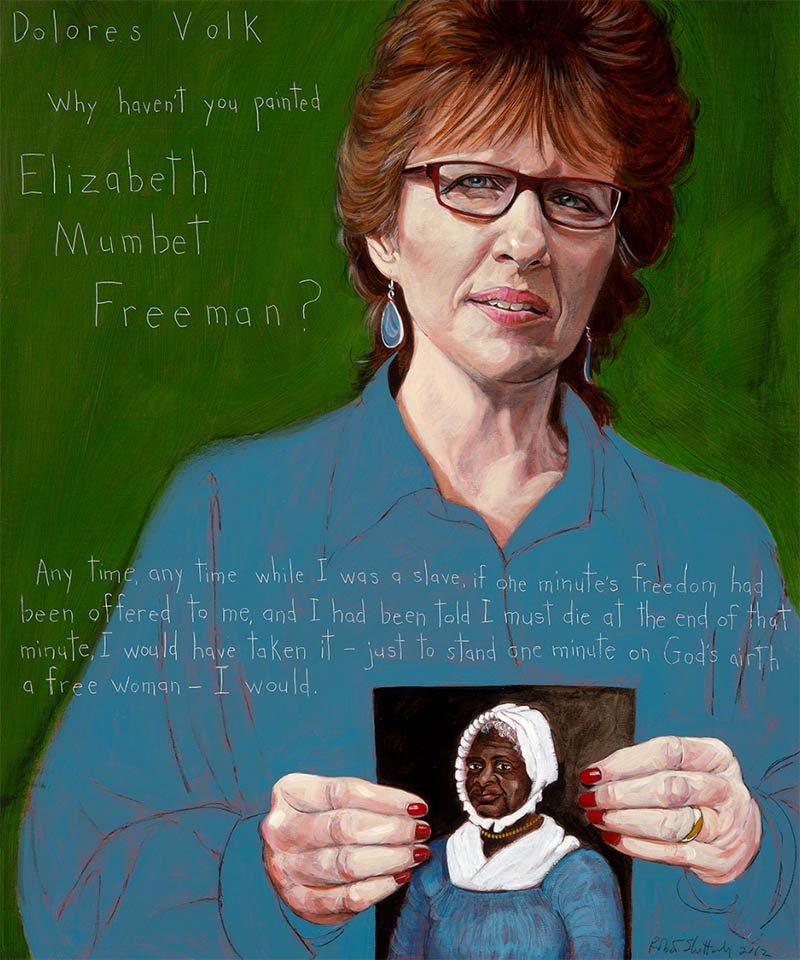
Elizabeth Mumbet Freeman and Dolores Volk
Elizabeth Freeman: Slave, abolitionist, freewoman. Dolores Volk: Teaching assistant, custodian : EF: 1742 - 1829. DV: b. 1960
“Any time, any time while I was a slave, if one minute’s freedom had been offered to me, and I had been told I must die at the end of that minute, I would have taken it — just to stand one minute on God’s airth a free woman — I would.”
Biography
In July 2012 I received this email:
Hello Mr. Shetterly,
I clean the restrooms on 3rd shift at Miami University in Oxford, Ohio. I was moved to McGuffey Hall a few weeks ago and have been fascinated by your paintings because they look like they could come right off of the canvas and talk to me. Every night when I am walking that hallway I think of one thing…Someone is missing…It’s Elizabeth “Mumbet” Freeman. She would be a worthy subject for your series, in my opinion with the highlighted quote of course! My husband says they should erect a monument of her right next to Thomas Jefferson (America’s revered slave owner). I think it would be wonderful to see her portrait on that wall some day!
— Dolores Volk
Elizabeth – “Bett” – was born in upstate New York in 1742, 55 years before Sojourner Truth, but, like Sojourner, onto a Dutch farm and into slavery. Her master, Pieter Hogeboom, “gave” Bett to his daughter Hannah when she married John Ashley of Sheffield, Massachusetts. There Bett remained a slave until 1780, when, as the Revolutionary War ended the Declaration of Independence was being taken to communities in all the colonies and read publicly. Bett was present at the reading in Sheffield.
Moved by the language about unalienable rights and equality, she went right away to a young lawyer, Theodore Sedgwick, and asked him to take the case to free her. Mr. Sedgwick, impressed with Elizabeth and opposed to slavery himself, decided to take her case. Brom and Bett vs Ashley was heard in a courtroom in Great Barrington, Massachusetts. On August 22, 1781, the jury ruled in Bett’s favor, granting her not only freedom, but also compensation for lost wages (thirty shillings) for the years she worked as a slave with no pay. Her case was cited shortly afterwards in the State Supreme Court when it stuck down the legality of slavery in Massachusetts.
Bett then went to work – with pay – in her lawyer’s house and helped to raise his children. One child, Catharine Maria Sedgwick, loved and admired Bett, and wrote her history after Bett’s death in 1829, which was published with the title Slavery in Massachusetts in Bentley’s Miscellany.
Catharine Sedgwick’s account of Bett’s life (see the Resources section beside this biography) is full of surprising, vivid anecdotes and wonderful quotations. In addition, the only surviving image of Elizabeth Freeman is a miniature watercolor by Catharine Sedgwick.
Since I don’t paint these portraits from other people’s paintings, I decided the paint a portrait of Dolores Volk encouraging me to paint Mumbet’s portrait. Dolores then becomes a metaphor for all the people who have encouraged me to paint particular portraits and a metaphor for the importance of sharing the stories of the people in this series.
The Americans Who Tell the Truth project has become all about education, including my own. In the past ten years I have learned more about our history and some of the people who have guided its positive evolution than I would have ever thought possible. Many of the people I’ve painted, like Ms. Freeman, were totally unknown to me before I began the portrait series. And many of these were urged on me by people who wrote to me with the compelling stories of people I then decided I had to paint.
In this case, I was told about Ms. Freeman (the name she took upon the success of her case) not by a student at Miami University and not by a professor, but by a woman, Mrs. Volk, who cleans bathrooms — the kind of work that Bett did. This is the kind of dialogue between people and between people and US history that AWTT aspires to.
Then, think about Elizabeth Freeman. As an illiterate slave she filed a case in court by appealing to the newly written ideals of the Declaration of Independence. Ironically, seventy-six years later, her suit would have been illegal; in 1857, in the Dred Scott Decision our Supreme Court stripped all black citizens of their legal rights including the right to challenge their status as property, affirming that property rights trump unalienable rights.
In 1781, however, the case could be brought to court and argued in the legal and political atmosphere of revolutionary Massachusetts where words were considered to have meaning, and meaning to have consequence. As Bett realized, “all men are endowed” and “unalienable rights” meant the same for her as well as for her white lawyer, or they meant nothing.
Elizabeth Freeman’s story illustrates the great bounty of living in a system whose legal concern is justice: a marginalized person — black, female, indigent, enslaved, illiterate — appeals to the law to grant her remedy from her complaint of injustice. It is that sense of justice which makes the rule of law a blessing of democracy rather a tool to enforce inequality.
Robert Shetterly
Programs
Americans Who Tell the Truth (AWTT) offers a variety of ways to engage with its portraits and portrait subjects. Host an exhibit, use our free lesson plans and educational programs, or engage with a member of the AWTT team or portrait subjects.

Education
AWTT has educational materials and lesson plans that ask students to grapple with truth, justice, and freedom.

Exhibits & Community Engagement
AWTT encourages community engagement programs and exhibits accompanied by public events that stimulate dialogue around citizenship, education, and activism.